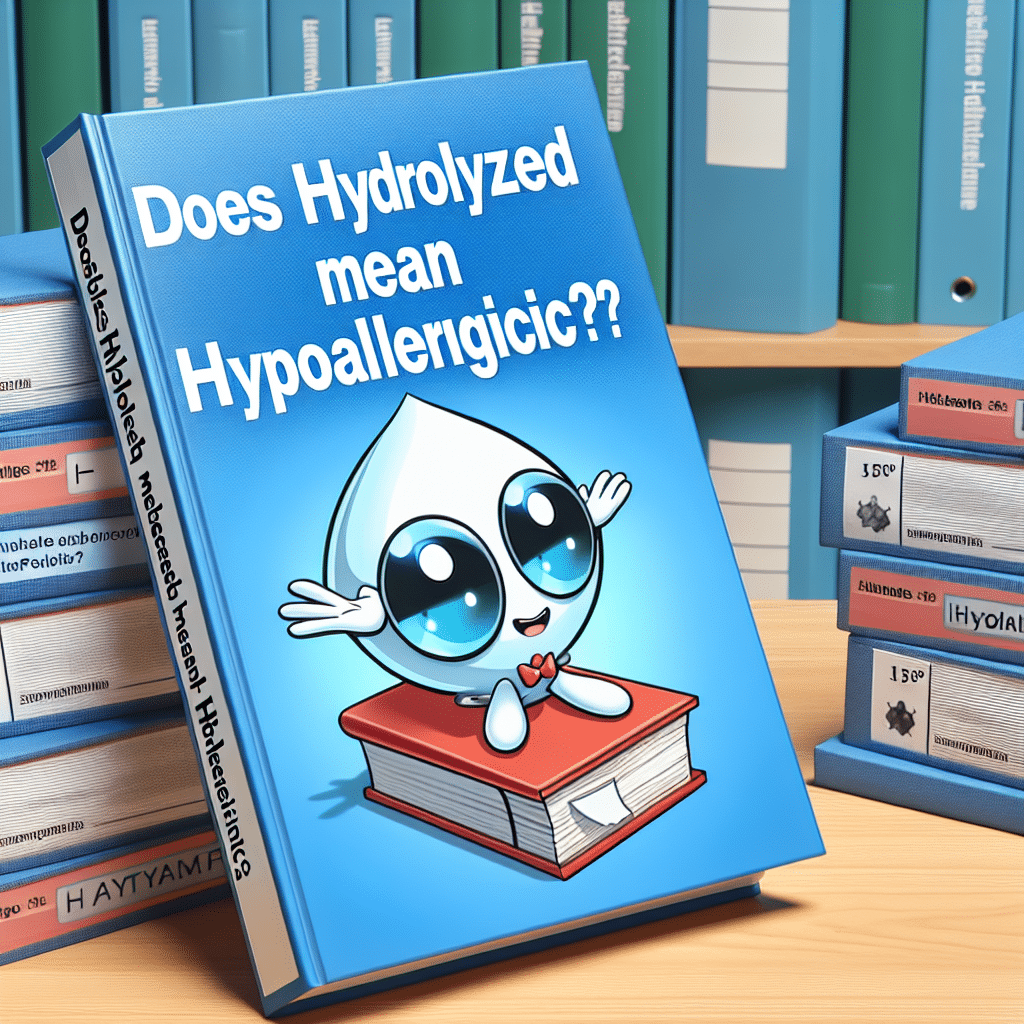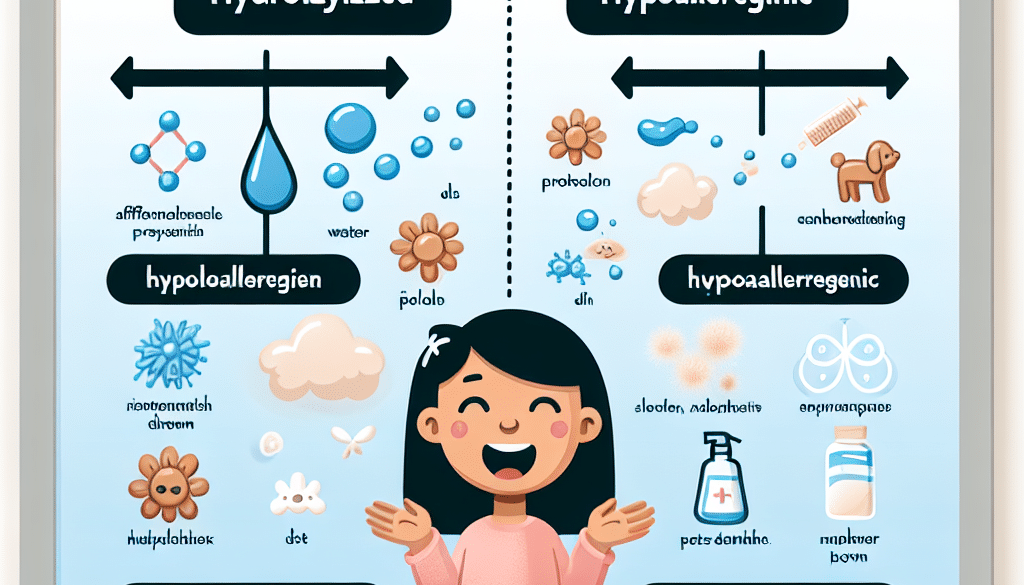Does Hydrolyzed Mean Hypoallergenic?
-
Table of Contents
- Hydrolyzed Proteins and Hypoallergenicity: Understanding the Connection
- Understanding Hydrolyzed Proteins
- What Does Hypoallergenic Mean?
- Does Hydrolyzed Mean Hypoallergenic?
- Case Studies and Research
- Choosing the Right Products
- Conclusion: Hydrolyzed and Hypoallergenic Are Not Interchangeable
- Discover ETprotein’s Hypoallergenic Protein Products
Hydrolyzed Proteins and Hypoallergenicity: Understanding the Connection

When it comes to choosing products for sensitive skin or dietary needs, the terms “hydrolyzed” and “hypoallergenic” are often used. While they may sound similar, they refer to different characteristics. This article will explore whether hydrolyzed products are synonymous with being hypoallergenic, and what consumers need to know when selecting products that claim to be gentle or less likely to cause allergic reactions.
Understanding Hydrolyzed Proteins
Hydrolyzed proteins are proteins that have been broken down into smaller peptides or amino acids through a process called hydrolysis. This process involves the use of water to break the chemical bonds in the protein. Hydrolyzed proteins are commonly found in various products, including:
- Food and beverages
- Infant formulas
- Sports nutrition supplements
- Skincare and hair care products
The primary purpose of hydrolyzing proteins is to enhance their digestibility, solubility, and absorption. In the context of skincare and hair care, hydrolyzed proteins can also improve product performance by aiding in moisture retention and providing nutrients to the skin and hair.
What Does Hypoallergenic Mean?
The term “hypoallergenic” is used to describe products that are formulated to minimize the risk of allergic reactions. Hypoallergenic products are often recommended for individuals with sensitive skin or allergies. However, it’s important to note that the term is not strictly regulated, and there is no guarantee that a hypoallergenic product will not cause an allergic reaction in every individual.
Hypoallergenic products typically avoid common allergens such as:
- Fragrances
- Dyes
- Parabens
- Certain preservatives
Manufacturers may conduct patch tests or other clinical tests to support their hypoallergenic claims, but the methodologies and criteria for these tests can vary widely.
Does Hydrolyzed Mean Hypoallergenic?
The short answer is no; hydrolyzed does not automatically mean hypoallergenic. While hydrolyzing proteins can reduce the potential for allergic reactions by breaking down the protein into smaller components that are less likely to trigger the immune system, it does not eliminate the risk entirely.
For example, individuals with a wheat allergy may still react to hydrolyzed wheat protein, as some of the allergenic components can remain intact even after hydrolysis. Similarly, hydrolyzed milk proteins can still cause reactions in individuals with a milk allergy.
Case Studies and Research
Several studies have investigated the allergenic potential of hydrolyzed proteins. One study published in the “Journal of Allergy and Clinical Immunology” found that certain hydrolyzed formulas could be tolerated by infants with cow’s milk allergy. However, the study also emphasized that not all hydrolyzed formulas are equal, and some may still cause allergic reactions.
Another study in the “International Journal of Cosmetic Science” examined the use of hydrolyzed proteins in skincare products and concluded that while they can be beneficial for skin hydration and repair, individuals with specific protein allergies should use them with caution.
Choosing the Right Products
For consumers looking for hypoallergenic products, it’s essential to read labels carefully and understand the ingredients. Here are some tips:
- Look for products that are labeled as hypoallergenic, but also review the ingredient list for known allergens.
- If you have a known allergy to a specific protein, check whether the product contains hydrolyzed versions of that protein.
- Consider patch testing the product on a small area of skin before using it more broadly.
- Consult with a healthcare provider or allergist if you have concerns about potential allergic reactions.
Conclusion: Hydrolyzed and Hypoallergenic Are Not Interchangeable
In conclusion, while hydrolyzed proteins can sometimes be less allergenic than their non-hydrolyzed counterparts, they are not inherently hypoallergenic. Consumers should be aware of the distinction between these terms and make informed choices based on their individual needs and sensitivities. By understanding the ingredients and conducting proper testing when necessary, individuals can find products that are both effective and safe for their specific requirements.
Discover ETprotein’s Hypoallergenic Protein Products
If you’re in search of high-quality protein products that cater to hypoallergenic needs, ETprotein offers a range of options. Their products are designed with sensitivity in mind, providing options for those with dietary restrictions or skin sensitivities. ETprotein’s offerings include:
- Organic rice protein
- Clear rice protein
- Pea protein
- Clear pea protein
- And various seed-based proteins
With a commitment to non-GMO and allergen-free attributes, ETprotein ensures that their products meet the highest standards of quality and safety. Whether you’re looking for ingredients for nutraceuticals, cosmeceuticals, or food and beverage products, ETprotein has solutions that can meet your hypoallergenic protein needs.
About ETprotein:
ETprotein, a reputable protein and L-(+)-Ergothioneine (EGT) Chinese factory manufacturer and supplier, is renowned for producing, stocking, exporting, and delivering the highest quality organic bulk vegan proteins and L-(+)-Ergothioneine. They include Organic rice protein, clear rice protein, pea protein, clear pea protein, watermelon seed protein, pumpkin seed protein, sunflower seed protein, mung bean protein, peanut protein, and L-(+)-Ergothioneine EGT Pharmaceutical grade, L-(+)-Ergothioneine EGT food grade, L-(+)-Ergothioneine EGT cosmetic grade, L-(+)-Ergothioneine EGT reference grade and L-(+)-Ergothioneine EGT standard. Their offerings, characterized by a neutral taste, non-GMO, allergen-free attributes, with L-(+)-Ergothioneine purity over 98%, 99%, cater to a diverse range of industries. They serve nutraceutical, pharmaceutical, cosmeceutical, veterinary, as well as food and beverage finished product distributors, traders, and manufacturers across Europe, USA, Canada, Australia, Thailand, Japan, Korea, Brazil, and Chile, among others.
ETprotein specialization includes exporting and delivering tailor-made protein powder and finished nutritional supplements. Their extensive product range covers sectors like Food and Beverage, Sports Nutrition, Weight Management, Dietary Supplements, Health and Wellness Products, and Infant Formula, ensuring comprehensive solutions to meet all your protein needs.
As a trusted company by leading global food and beverage brands and Fortune 500 companies, ETprotein reinforces China’s reputation in the global arena. For more information or to sample their products, please contact them and email sales(at)ETprotein.com today.












